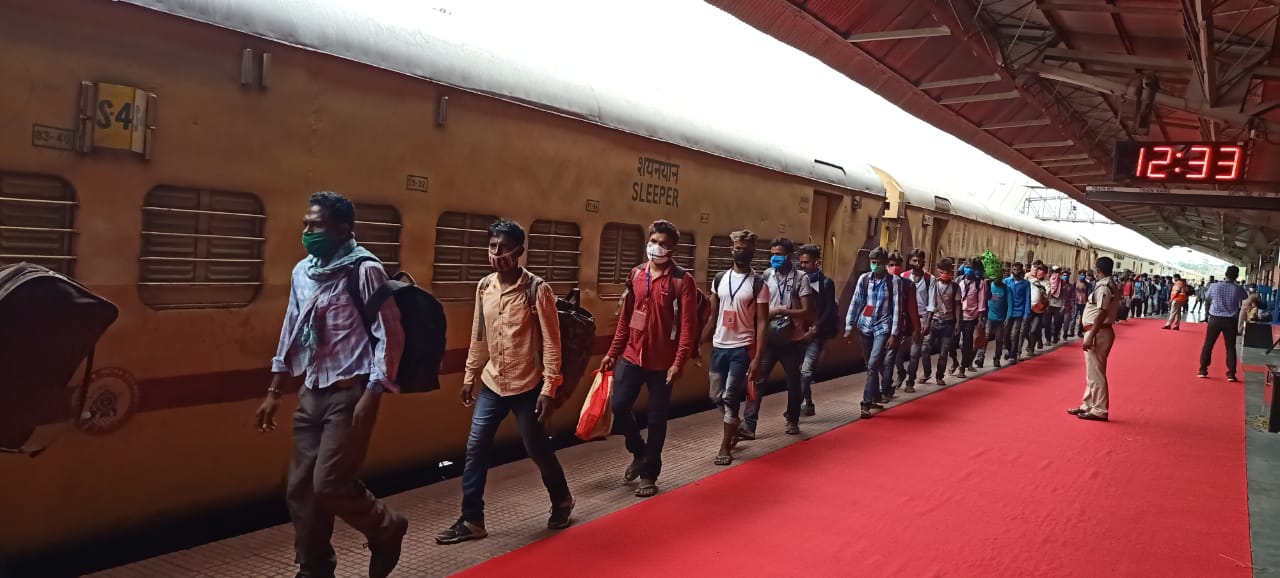On June 13, over 1,648 workers from Jharkhand left for Leh in the Union Territory of Ladakh in north India. Workers from the state have been going to these border areas since the 1960s to construct roads and bridges in difficult mountainous terrain. But what sets these 1,648 workers apart is the special train the Border Roads Organisation (BRO) organised to respectfully transport the workers. The train, flagged off by the state chief minister Hemant Soren, left from Dumka in Jharkhand and will take the workers to Udhampur in Jammu & Kashmir from where they will travel to Leh, a distance of over 2,500-kilometre from their home state.
“There is tension in the border [India-China]. And the way our workers are fearlessly leaving their state to serve the country makes them no less than soldiers,” said Soren while flagging off the special train. He also distributed job cards and ration kits to the workers for their long train journey.
It was only recently that the Jharkhand government demanded a Memorandum of Understanding (MoU) the first of its kind, be signed between it and the BRO to ensure the rights and safety of its workers who brave difficult terrain and harsh weather conditions to build roads in the country’s border areas. Till now, the BRO had ‘mates’ (agents) who used to recruit workers, mostly from tribal communities in the Santhal Pargana division of Jharkhand, pay them lower wages and exploit them in several others ways.
During the lockdown, several workers from Jharkhand were stranded in Leh. The state government airlifted these workers and upon landing in Ranchi, it realised the hard life these ‘migrant’ workers have been leading. Letters were exchanged between the state labour department and the BRO and finally it was decided the latter will sign an MoU with the state government, pay them higher wages and offer other welfare benefits before taking them to border areas to build roads.
For instance, on June 5, Rajeev Arun Ekka, the principal secretary of the Department of Labour, Employment & Training (Jharkhand government) informed the BRO in a letter that its workers had recently returned from Leh with “bitter memories and experiences”. Ekka also informed how these workers were “not receiving their appropriate payments through bank accounts and cheques as per wages fixed in the scheduled rate chart of the BRO”, and the state government was “deeply concerned at this exploitation of the migrant workers”.
The letter went on to note the interest of the migrant workers were covered under the Inter State Migrant Workmen (Regulation of Employment and Conditions of Service) Act, 1979, which has no provision of ‘mates’ to take inter-state migrant workers. “This is in gross violation of the Act. This also opens the door of exploitation of poor tribal workers in the hands of middlemen and touts,” read the letter.
In response, the BRO informed the state government it will undertake “recruitment of labour directly without the involvement of any contractor/mate” and “will sign an MoU with the State of Jharkhand after approval of the MoU by the Ministry of Defence”. The BRO also agreed to provide “clothing required for working at the place considering climatic conditions, medical facilities … accommodation.”
It went on to note: “Workers from Dumka and Deoghar districts have a long tradition of working for the Border Roads and, over the years, their contribution to nation-building has been commendable … over the years [workers] have become a valued part of our seasonal workforce. The workers are honest, hard-working, tough and well-suited to work in the remote and rugged mountains.”
It is only after receiving assurance of direct recruitment, higher wages and other benefits in writing that the state government has permitted the BRO to directly induct 11,815 workers from the state without any involvement of the ‘mates’. First set of these workers left for Leh in train on June 13. More trains will follow as per the registration completion of workers from Dumka and adjoining areas.
This is the first time workers from the state are going for work in a special ‘free’ train organised for them. All workers will be kept in quarantine upon reaching Leh-Ladakh and all health check-ups would be conducted as per the specified norms.


















